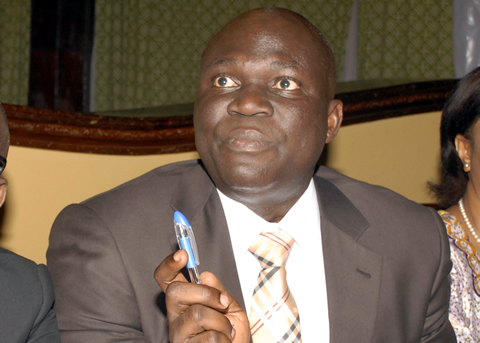In many respects, Africa is on the cusp of a new dawn. Never in the history of the continent has technology and society had such a close relationship as we see it today, as the activities of citizens, companies and governments continue to generate information and data at a rate unforeseen in human history.
Data is poised to be the next most valuable natural resource, and from all indications, Africa is not prepared to be left behind in the emerging data-driven global economy. The combination of data and the mobile culture will be a key competitive advantage for citizens, companies, national and sub-national governments in Africa, fueling vast economic growth and societal progress.
Recent studies show reveal that 80% of all the data in the world was created in past three years. This is one of the reasons why two-thirds of IBM’s technology research’s work is now devoted to data, analytics and cognitive computing.
There will also be a three-fold increase in data-transmitting transistors per human by 2017. Humanity currently generates about 2.5 quintillion bytes of data from a variety of sources daily – from emails, blogs and climate information to posts on social media sites, and purchase transaction records to healthcare medical images. Africa’s share of this global data mix is bound to be significant, especially as mobile communications adoption and internet usage on the continent continues to grow.
Advertisement
Close to 70 per cent of Africa’s population now comprises of millennials – many of whom have grown up seeing mobile devices as a normal part of everyday life. As the region’s future decision-makers, customers, and constituents, these millennials will be major stakeholders in the success of both Africa’s businesses and governments – from hiring top talent to ensuring satisfaction with public services.
The millennial generation in Africa and elsewhere have much to contribute when it comes to moving enterprise organizations along the path toward greater mobility – but only if it is empowered to do so. More than 30 percent of millennials globally view work/life flexibility as essential to being engaged at work, according to a recent study by the IBM Institute of Business Values.
Businesses however looking to mobilize their workforce can no longer rely on a top-down approach. Instead, they must enlist the help of their tech-savvy millennial employees and tap into the generation’s inherent understanding of what it means to be truly mobile. In the enterprise space, this manifests itself in two ways – ensuring that millennial employees are armed with the right tools to provide the best possible experience for customers and encouraging their feedback on and involvement with new mobile developments.
Advertisement
Mobility is an enabler for business transformation and a catalyst for innovation. African enterprises which effectively harness the power of mobility will begin to uncover valuable hidden insights that lead to new products and services, gain a deeper understanding of stakeholders’ needs, and benefit from faster transformation and results. The implementation, however, can be an uphill battle for many organizations.
Beyond these peculiar infrastructure challenges in the African environment, employees may also lack the necessary skills and many businesses have yet to implement an effective mobile strategy that ensures accessibility without compromising security. Along with growing security concerns, consumer expectations of mobile offerings also continue to rise, and the pressure is building on organizations to derive and action on the real-time information generated by mobile devices. Millennial employees, however, can help bridge the gap. As organizations explore new ways to leverage the feedback cycle between mobile services and end-users, millennials can assist businesses in creating increasingly targeted experiences to maintain the attention of young consumers.
As the future leaders of change, millennials have a vested interest in the mobility of their employers. And with more millennials flooding the workforce pool, they will continue to prioritize working on mobile devices. In fact, millennials in the Middle East and Africa region are optimistic about their abilities – a recent survey from Telefonica found that 81 percent of the region’s millennials believe they are on the cutting-edge of technology, compared with 75 percent worldwide.
Businesses in Africa can seize this unique opportunity as a way of improving customer interactions. As younger employees are more likely to be on the front line of an organization – perhaps, working as customer service representations, or managing and providing content for brand social media channels. By empowering the employees with direct access to customers – with streamlined access to real-time information – organizations can ensure a better experience for their customers.
Advertisement
We are increasingly living in the era of the Mobile Mentor. When we think of the word ‘mentor’, most people tend to picture a veteran with decades of experience. However, when it comes to embracing mobility, it is the up-and-comers who have the advice to offer. Corporations and governments in Africa can benefit from direct input by millennial employees. By encouraging the feedback of younger employees, businesses can find out exactly what millennials workers and consumers are expecting from new mobile services and gain deeper insight into ways to streamline functionality.
Citibank is an example of a company which has successfully implemented this practice. Its reverse mentoring program pairs senior executives with undergraduates to work together on projects, helping the company stay one step ahead of the top technology trends and laying a foundation for improved recruiting and new talent cultivation and generation.
IBM is also encouraging its millennial employees to join the wider business conversation. Through its Emerging Leaders program, millennials were able to join more than 1500 C-level executives in discussing how to use enabling technologies including mobile, cloud, and Big Data analytics as a competitive advantage. By tapping into the digital wisdom of millennials, organizations can unlock new ways to solve business challenges, enhance productivity and better define the needs and strategic interests of the corporation in the future of the marketplace.
Otiti is Country General Manager, IBM West Africa
Advertisement
Views expressed by contributors are strictly personal and not of TheCable.
Add a comment





